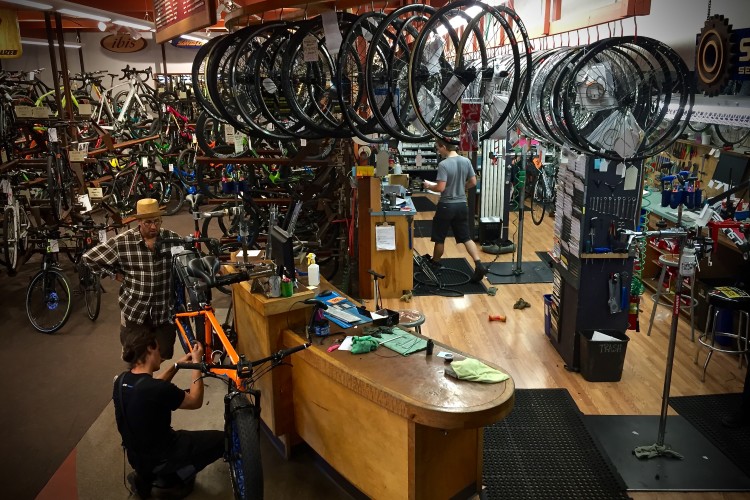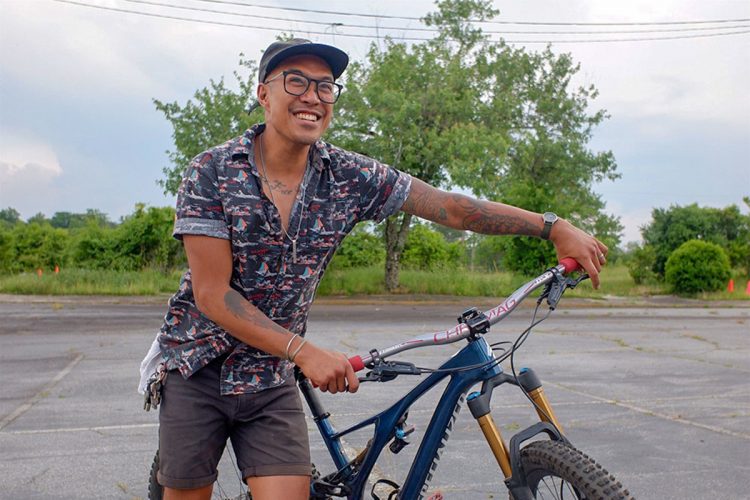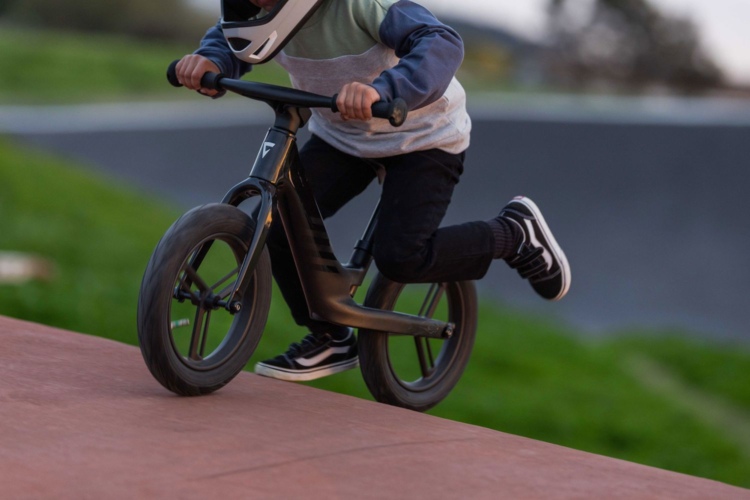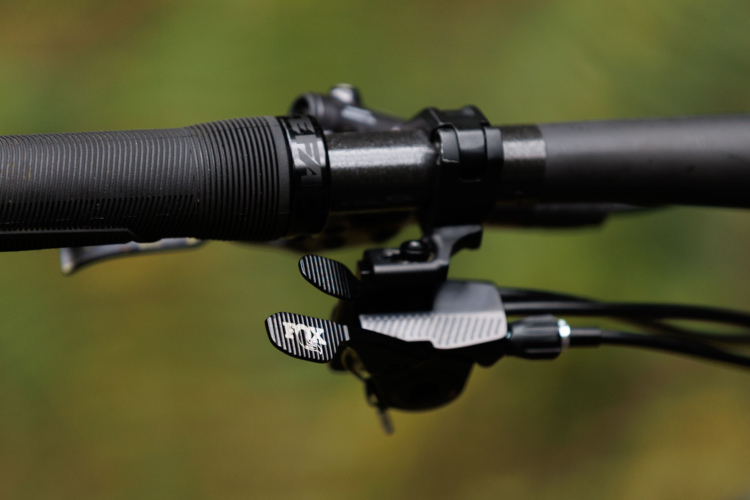
Last summer, a friend of mine set out on a road trip around the Northwest intending to ride some of the area’s excellent mountain biking destinations. He descended a particularly steep chute at one of his stops when he lost control for a second and bashed his wheel into a rock. The result was two broken spokes, one bent, and a wheel out of true.
Three of the area’s bike shops gave my friend a timeline of at least four days to fix his wheel. Another told him they were a week out. This was on day one of three total days to ride in the area. Luckily, he found a used wheel on Craigslist and his adventure continued, only missing one day of riding.
I’m sure many of us have had a similar experience, wheeling our bike into a shop, and walking out bikeless for the next week. Bike shops aren’t to blame — with the rise in the sport’s popularity, they can only do so much in a day. But what if there was a different way, where the shop could come to you and have you back on the trails sooner? Enter the mobile bike shop.
This Sounds Familiar…
If the idea of your local bike shop rolling up to your front door seems alien, it might surprise you to find out that is how The Lost Co. started. The now major online retailer was once just a guy and an old U-Haul truck, parked at trailheads in the Bellingham, Washington area. In just seven years, a U-Haul truck turned into a booming e-commerce warehouse and social media presence. One guy turned into six and the mobile bike shop became an online bike shop in many ways. Singletracks wrote about another U-haul turned mobile bike shop back in 2009.
But is this a repeatable model? Which stars and moons needed to line up for stories like The Lost Co.’s to be successful? How do businesses like these start and is there an opportunity for more?
Chariot Bike
In 1948, Norma Jean Belloff rode her bike across the country, establishing the first female record for cycling across the nation. Over 70 years later, her legacy lives on in her granddaughter, Julia Sparks, who turned her passion for cycling into a mobile bike shop, Chariot Bikes.
Sparks landed a job at a bike shop during her college years and never turned back. After college, she relocated to Bend, Oregon, where she continued to work in bike shops. Like many in the bike industry, Sparks was laid off when the bike shop she worked at, like many businesses around the country, temporarily closed due to COVID. Not liking that much downtime, Sparks found ways to keep herself busy.
“I had been laid off for a bit, and I can’t stop doing things so I just worked on projects in my garage,” she said. “I’d be working on my own bikes and neighbors would ask if I could fix theirs.”
Sparks explained that fixing neighbors’ bikes turned into fixing bikes belonging to the friends of neighbors, then friends of friends, and so on. Eventually, she made a little sandwich board and was fixing bikes for a donation.
“Nobody could go to bike shops, so I ended up getting really busy. I always wanted my own little shop and thought maybe it was a good time to try it.”
Bend certainly isn’t in any sort of bike shop shortage, but mobile shops are pretty few and far between. Sparks recognized this and saw a business opportunity. She bought a Ram ProMaster, built it out with help from friends and later had it wrapped.
“The wrap is like a giant billboard driving around town,” she said. “With word of mouth and a giant billboard, it kind of took off,” Sparks told me. Business boomed for Sparks during COVID, building a “faceless” customer base of sorts. As COVID restrictions were lifted across the country, Chariot Bikes continued to offer its services to customers across the area, but with more face-to-face opportunities. And, they were slowly growing out of the van.
Storage needs had Sparks leasing a space in a warehouse. This eventually turned into Sparks opening a brick-and-mortar shop, while still providing mobile services.
“It’s really great to have both. Lots of my customers were really excited to come see the shop, but I still have many customers who love the convenience of mobile.”
With the move to brick-and-mortar, Sparks didn’t want to just have a bike shop, but a space people could come to. Sparks created a community hang-out as much as a bike shop. It’s a space where bikes, art, and coffee are all intertwined. “Things like that are hard to do in a van.”
“The van also brings other opportunities, like getting hired to be a mechanic at an event,” Sparks told me. The mobile aspect seems to remain an integral part of Chariot Bike’s business. They frequently receive calls for mobile repairs, and either she or her other mechanic hops in the van and goes. “Now I do ‘Brick-and-Mobile’.”

The Cycle Shack
Trailheads are often the place where you need a mechanic the most. Rides have ended early for me more than once because I’m in need of a repair that requires a bit more than my multitool offers.
That is exactly what Andy Heller, owner of Cycle Shack Mobile Bike Repair. Heller, born and raised on the East Coast, found his way out west in 2016, landing in Bend, Oregon. Growing up in New Jersey, Heller was the kid constantly hanging around the bike shop who eventually was given a job. Bikes quickly became his passion.
After making it to Bend, Heller found himself at one of the area’s largest trail systems, Phil’s Trailhead. He threw his own bike in his bike stand, giving it a quick tune. He found people were willing to throw a few bucks his way to do the same. It quickly turned into a business.
“In the morning, I’d roll up to the trailhead, make a bunch of coffee, and just hang out until somebody rolled by with a squeaky brake and I’d fix it for them.” Heller chatted with his customers, fixing their bikes while they sipped coffee. The convenience of the bike shop came to the trailhead.
Heller certainly credits his early days at the trailheads as being a major player in recognizing where he could fill a need. He would often be working on customers’ bikes who have put off repair for a long time. “Customers would have to leave their bike at the shop for a spot in the queue. Then they’re 2 or 3 weeks without a bike, which sucks. I’d rather ride a squeaky bike for 2 weeks and get it fixed the same day than be without one.”
The trailheads were a great starting point for Cycle Shack, but as Heller continued to build a client base, he transitioned to setting up at customers’ houses. “I load up the car with my tools and stand, show up at my customers’ houses, and fix their bikes in their driveway.” Heller can be seen cruising all over the Bend in his 1980 VW Rabbit.
With Bend being a major tourist destination, Heller has also taken advantage of the many mountain bikers passing through on vacation. “I’ll get calls from people staying in their campers and vans, staying up the Cascade Highway. They need a repair and they tell me the shops are backed up.” Heller told me the tourist feel it’s a bonus that he comes to them.
Being mobile, Heller’s repairs are practical. Without a huge backstock of inventory at Cycle Shack, Heller has to be creative. What he often finds, especially with customers on road trips, is they need a repair to get them by.
“Usually I’ll find something for them here in town, a like-for-like replacement,” he said. “It may not be as nice but it will get you back on your bike.”
Visitors come to Bend for the trails, and while it may be financially beneficial for Heller to get a customer that Industry Nine replacement wheel, he realizes they just don’t have the time. He troubleshoots an affordable solution that gets them back on the trails ASAP.
With so many bike shop options in Bend, breaking into that market requires a niche. Heller and Cycle Shack’s niche: vintage bikes. Heller is most passionate about restoring older bikes, like his original Kona Humuhumu he rolled up on.
“I love it when people bring me their old Cannondale Super V that has been in their shed for 20 years and want to get it running again. I love it when people bring me stuff like this,” Heller said, gesturing to his Kona. He pointed out that people can feel embarrassed taking a 20-year-old bike into a bike shop. Pointing back towards his Kona, he told me, “Right now, that’s the only mountain bike I own. It’s easy to work on, parts are cheap, and it makes me smile more than any other bike I’ve ridden.” Those bikes are his bread and butter.

Is There A Special Recipe?
So, did stars and moons align for Chariot Bikes and Cycle Shack to work out? In a word, yes.
Obviously, COVID changed how we operate on a daily basis. It seems that we can look back on our struggles during COVID restrictions, and see opportunities we may not have had. So, I wondered, was COVID somewhat responsible for mobile bike shops? Sparks seemed to think so.
“I think it did help a lot,” she said. “It was needed at the time, but now, not so much. It’s more of a convenience thing now.”
And does it take a special area, such as Bend, Oregon, for a business model such as a mobile bike shop to work? “If there weren’t so many bikes per capita, the bike shops would be able to handle the workload,” he said. “So many calls that I do get are from people telling me they just got off the phone with this or that bike shop.”
It seems there is always going to be a bit of luck in every successful venture. However, to chalk this solely up to luck wouldn’t be fair. Without a doubt, both Sparks and Heller are good at what they do—they are both respected mechanics.
They also recognized how to take hold of the opportunity they saw before them. They created spaces for the community to be in. They created environments where the price, or age of a bike didn’t matter. Bikes are bikes, and they are stoked people are joining the community. Most of all, they created opportunities to share their love of biking with others, finding ways to help people get on their bikes and back on the trails.




















0 Comments